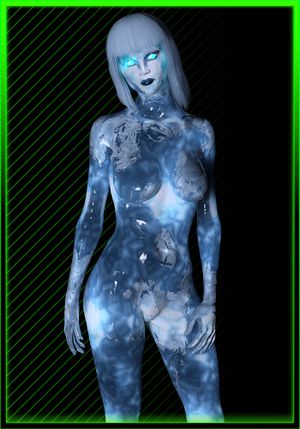Difference between revisions of "Yuki-onna"
| (4 intermediate revisions by the same user not shown) | |||
| Line 1: | Line 1: | ||
{{ Character | {{ Character | ||
| − | | image= | + | | image=YukiWiki.jpg |
| name=Yuki-onna | | name=Yuki-onna | ||
| race=[[Undead]] | | race=[[Undead]] | ||
| Line 9: | Line 9: | ||
}} | }} | ||
In Japanese folklore, a yuki-onna (雪女, “snow woman”) is a spirit or yōkai. Yuki-onna originates from folklores of olden times; in the Muromachi period Sōgi Shokoku Monogatari by the renga poet Sōgi, there is a statement on how he saw a yuki-onna when he was staying in Echigo Province (now Niigata Prefecture), indicating that the legends already existed in the Muromachi period. In reality, they are a woman that either died wandering alone in the frozen wilderness or that were murdered and their bodies were buried in the snow. Either way, their vengeful spirits refused to rest and they rose as icy yuki-onnas. They become little more than ice and snow. With only a cold, undying hatred for life, they seek the living to share their fate. As silent as a fallen shroud of snow, they approach and grasp their prey tightly. Then, they will kiss them, draining them of life and converting their victim into one of their own. | In Japanese folklore, a yuki-onna (雪女, “snow woman”) is a spirit or yōkai. Yuki-onna originates from folklores of olden times; in the Muromachi period Sōgi Shokoku Monogatari by the renga poet Sōgi, there is a statement on how he saw a yuki-onna when he was staying in Echigo Province (now Niigata Prefecture), indicating that the legends already existed in the Muromachi period. In reality, they are a woman that either died wandering alone in the frozen wilderness or that were murdered and their bodies were buried in the snow. Either way, their vengeful spirits refused to rest and they rose as icy yuki-onnas. They become little more than ice and snow. With only a cold, undying hatred for life, they seek the living to share their fate. As silent as a fallen shroud of snow, they approach and grasp their prey tightly. Then, they will kiss them, draining them of life and converting their victim into one of their own. | ||
| − | + | ||
| − | + | == Desideratum: Blood Bonds == | |
| + | This creature appears while [[Absinthe Van Gothen]] is searching [[Mount Hood]] for the missing [[Jacques Lombar]]. | ||
| + | |||
| + | == Notes and Trivia == | ||
| + | A yuki-onna may also go by such names as yuki-hoe (“snow daughter”), yuki-onago (“snow girl”), yukijorō (雪女郎, “snow woman”), yuki anesa (“snow sis”), yuki-onba (“snow granny” or “snow nanny”), yukinba (“snow hag”) in Ehime, yukifuri-baba (“snowfall hag”) in Nagano. They are also called several names that are related to icicles, such as tsurara-onna, kanekori-musume, and shigama-nyōbō. | ||
Latest revision as of 14:49, 2 November 2021

| Name | Yuki-onna |
| Race | Undead |
| Type | Elemental |
| Faction | Independent |
| Premiere | Desideratum: Blood Bonds |
| Relative(s) | None Applicable |
In Japanese folklore, a yuki-onna (雪女, “snow woman”) is a spirit or yōkai. Yuki-onna originates from folklores of olden times; in the Muromachi period Sōgi Shokoku Monogatari by the renga poet Sōgi, there is a statement on how he saw a yuki-onna when he was staying in Echigo Province (now Niigata Prefecture), indicating that the legends already existed in the Muromachi period. In reality, they are a woman that either died wandering alone in the frozen wilderness or that were murdered and their bodies were buried in the snow. Either way, their vengeful spirits refused to rest and they rose as icy yuki-onnas. They become little more than ice and snow. With only a cold, undying hatred for life, they seek the living to share their fate. As silent as a fallen shroud of snow, they approach and grasp their prey tightly. Then, they will kiss them, draining them of life and converting their victim into one of their own.
Desideratum: Blood Bonds
This creature appears while Absinthe Van Gothen is searching Mount Hood for the missing Jacques Lombar.
Notes and Trivia
A yuki-onna may also go by such names as yuki-hoe (“snow daughter”), yuki-onago (“snow girl”), yukijorō (雪女郎, “snow woman”), yuki anesa (“snow sis”), yuki-onba (“snow granny” or “snow nanny”), yukinba (“snow hag”) in Ehime, yukifuri-baba (“snowfall hag”) in Nagano. They are also called several names that are related to icicles, such as tsurara-onna, kanekori-musume, and shigama-nyōbō.